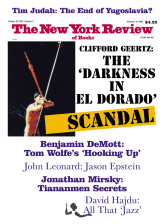To the Editors:
For two hundred and thirteen years, against formidable obstacles, democracy in America has expanded. We opened up the right to vote, securing the popular election of US senators and presidential electors, securing voting rights for the poor, women, and blacks. Now, in an act no less reprehensible than the partisan resolution of the election of 1876, a narrow majority of the Supreme Court has pulled the nation backward. Its decision to halt the full and accurate counting of Florida’s legal votes prevents the American people from selecting the next president of the United States.
The narrow majority has simultaneously cast doubt upon its own motives and undermined the legitimacy of the next chief executive. There is, justifiably, a widespread impression that this narrow majority acted as it did in order to install a Republican president and to expand its political position on the Court.
Historians will draw their own conclusions about the election of 2000, based on the facts and evidence as they emerge. But there are already strong reasons to believe that the candidate who, on November 7, won enough votes to carry the Electoral College is the one who will not become president.
We are outraged and saddened at this wound inflicted upon American democracy. We call upon our fellow citizens, Republicans, Democrats, and independents, to join us in dedicating ourselves to reform the electoral system so that the democratic will of the people is never again violated in an American election.
Lizabeth Cohen
Harvard
Todd Gitlin
New York University
David Greenberg
Columbia
David Brion Davis
Yale
George M. Fredrickson
Stanford
Michael Kammen
Cornell
Mary P. Ryan
University of California at Berkeley
Sean Wilentz
Princeton
Garry Wills
Northwestern
and more than 450 other historians.
This Issue
February 8, 2001



